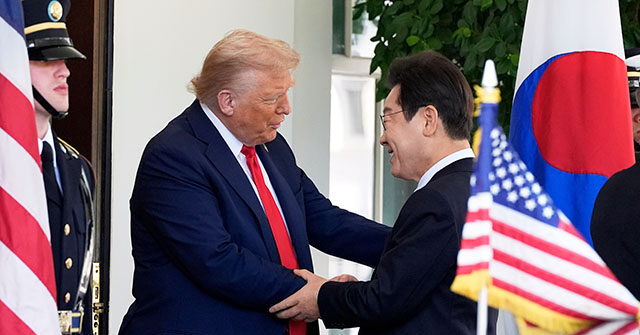President Donald Trump raised concerns Monday about ongoing political upheaval in South Korea, describing the situation as resembling a “purge or revolution” hours before his scheduled meeting with the country’s new president at the White House.
“WHAT IS GOING ON IN SOUTH KOREA? Seems like a Purge or Revolution. We can’t have that and do business there. I am seeing the new President today at the White House. Thank you for your attention to this matter!!!” Trump wrote in a Truth Social post.
Trump’s remarks come as South Korea faces months of political turmoil following the ouster of conservative former President Yoon Suk-yeol, who attempted to impose martial law in December 2022. Yoon was impeached and removed from office in April, and left-wing Democratic Party leader Lee Jae-myung won the June 2025 special election to replace him. Lee’s victory restored power to the left after his narrow defeat to Yoon in 2022.
The tensions have continued as conservative groups accuse China of interfering in Korean politics and supporting Lee’s election. Demonstrations condemning Beijing’s influence have taken place across Seoul, with groups such as “Freedom University” staging anti-communist rallies. Protesters reportedly destroyed a Chinese flag featuring images of President Xi Jinping and Chinese Ambassador Dai Bing during a demonstration, prompting South Korean police to summon the group’s leadership for questioning.
The Chinese government has openly praised Lee’s administration for condemning such protests. On August 15, Ambassador Dai celebrated Lee’s statements denouncing conservative assemblies as “hate rallies” and commended his government’s “commitment” to addressing anti-China voices. South Korea criminalizes insults against foreign diplomats, punishable by up to three years in prison, a law that police have cited in their investigations.
Lee has also called for stronger government action against what he describes as “fake news” on YouTube, a platform widely used by South Korean conservatives to criticize his administration. His government has proposed measures targeting alleged disinformation and discriminatory speech, sparking concerns among critics about free speech restrictions.
At the same time, Lee has sought closer ties with Beijing, Pyongyang, and Moscow, contrasting sharply with his conservative predecessor’s pro-American stance. Last month, he suspended anti-North Korean loudspeaker broadcasts on the border and expressed hopes for dialogue with Kim Jong-un, while also signaling a desire to deepen cooperation with China and Russia.
Trump, meanwhile, has pressured Seoul on trade, initially threatening 25-percent tariffs before negotiating a deal in July that committed South Korea to $350 billion in U.S. investment and a massive shipbuilding project. Monday’s White House meeting between Trump and Lee includes a bilateral meeting and lunch, their first official engagement since finalizing the trade and investment agreement.
Read the full article here


